Good Morning America to broadcast live from Asheville on Tropical Storm Helene recovery
On the six-month milestone marking Tropical Storm Helene's arrival in Western North Carolina, ABC's "Good Morning America" will broadcast live from Asheville to report on the recovery progress and ongoing challenges. GMA's two-hour special "Asheville Rising" will air from 7-9 a.m. March 27 on ABC affiliates.
“Those who love their dream of a Christian community more than they love the Christian community itself become destroyers of that Christian community even though their personal intentions may be ever so honest, earnest and sacrificial. God hates this wishful dreaming because it makes the dreamer proud and pretentious. Those who dream of this idolized community demand that it be fulfilled by God, by others and by themselves. They enter the community of Christians with their demands set up by their own law, and judge one another and God accordingly. It is not we who build. Christ builds the church. Whoever is mindful to build the church is surely well on the way to destroying it, for he will build a temple to idols without wishing or knowing it.”
~ Dietrich Bonhoeffer
I grew up in a beautiful little non-denominational protestant community church — the creed was quite simple.
It was Matthew 22:37-39.
“‘Love the Lord your God with all your heart and with all your soul and with all your mind.’ This is the first and greatest commandment. And the second is like it: ‘Love your neighbor as yourself.’”
We would have scripture readings, sing hymns and say the Lord’s Prayer, of course, but that was about it. I never heard any of these other readings like the Apostles' Creed until well into my adulthood, when I attended a Presbyterian Church service.
I was raised on the Sermon on the Mount, the Good Samaritan, turn the other cheek, the Golden Rule, the Parable of the Lost Sheep — the teachings of Jesus - and learning to behave in a way that demonstrated we acted on the character traits of Jesus.
For me growing up, the church represented faith, family, friends - most of my folks’ good friends went to the same church and their children continue to be some of my very best friends today. The minister and his wife were amongst my parents’ best friends. When I came back home from college, I can remember going to church and just being so happy to see and hug everyone. My little community church was a warm and loving place.
“Jesus loves me, this I know. For the Bible tells me so,” were the lyrics of the song I learned at Sunday School and they have stuck with me into my seventies. I find the song comforting. The tune and words come to me at the oddest moments: when someone has hurt my feelings, when I’m afraid, when I’m feeling uncertain, etc.
And my mother’s mantra was John 4:8 - “God is love.”
You get the gist - my Christian faith was based solely on service, kindness, forgiveness, abundance, generosity and love. It was pretty simple and pure.
I suppose that’s why I have been so stunned by the so-called Christian followers that seem to be attracted to our current president. In the 2024 U.S. presidential election, self-identified Christians, who constituted 72% of the electorate, favored Donald Trump over Kamala Harris by 56% to 43%. Among white evangelical Christians, Trump's support was even more pronounced, with approximately 80% casting their votes for him. Additionally, Trump secured 54% of the Catholic vote, marking a significant increase from the previous election cycle.
I’ve asked the question, that so many others have asked. Why do so many Christians support a candidate, who is the antithesis of Christ?
For most of the last decade, observers have been trying to understand why so many highly religious Americans have a favorable view of Donald Trump, asking how values voters can support a candidate who has been divorced twice, married three times and found liable for sexual abuse. Is Trump viewed most positively by those who might be described as “Christians in name only” – people who identify as Christians but aren’t actually religious? (Source: 5 facts about religion and Americans’ views of Donald Trump)
Religion in America is nothing new. Religious figures have been involved in American politics for much of our history. From Carrie Nation to William Jennings Bryan to Martin Luther King Jr. to Daniel and Philip Berrigan. But most of these figures have been personally religious too. Trump is not religious nor does he behave in a Christian manner. Why Trump?
“Mark my word, if and when these preachers get control of the [Republican] party, and they're sure trying to do so, it's going to be a terrible damn problem. Frankly, these people frighten me. Politics and governing demand compromise. But these Christians believe they are acting in the name of God, so they can't and won't compromise. I know, I've tried to deal with them.” ~Barry Goldwater
A few years ago, when a class on Christian Nationalism was offered at UNCA-OLLI College for Seniors, I decided I wanted to understand this better. The pre-reading was Katherine Stewart’s book, The Power Worshippers: Inside the Dangerous Rise of Religious Nationalism. I was really blown away reading this book and for the first time actually learning about Christian Nationalism.
What I learned is that Christian Nationalism has nothing do with religion - it’s a well-funded political movement disguised as religious. It is being used to reshape churches, rewrite textbooks, reconstitute the meaning of freedom of religion in our Constitution, and realign our politics and government. It’s about political power - not religious faith.
Christian Nationalism seeks to merge Christian and American identities, distorting both the Christian faith and America’s constitutional democracy. Christian Nationalism demands Christianity be privileged by the State and implies that to be a good American, one must be Christian. It often overlaps with and provides cover for white supremacy, xenophobia and racial subjugation.
America was constituted to be a pluralistic, secular society. Church was church. Government was government. Frankly, I think that has been one of our strengths. The First Amendment within the Bill of Rights is pretty explicit:
Congress shall make no law respecting an establishment of religion, or prohibiting the free exercise thereof; or abridging the freedom of speech, or of the press; or the right of the people peaceably to assemble, and to petition the government for a redress of grievances.
Since taking the class, I have been following many of the Christians who are fighting this movement. People like David French, Russell Moore, Tim Alberta, and others.
Rob Reiner put together a documentary, God & Country, on Christian Nationalism that I recommend. You can watch on Amazon Prime for free.
My nephew is in his 30s and we’ve had long discussions about the Christian religion about what it is and what it isn’t. Despite the fact that he grew up in a loving Christian home, the last time we talked about it, it seemed to him that the dominant voices promoting Christianity were behaving anything but Christian. The confusion is there and as a result people are turning away from organized religion. Christian Nationalism is destroying the faith of Christianity as well as America’s pluralistic society.
"The Religion then of every man must be left to the conviction and conscience of every man; and it is the right of every man to exercise it as these may dictate." ~James Madison
The Atlantic reporter, Tim Alberta, has also written another good book that I recommend: The Kingdom, the Power, and the Glory: American Evangelicals in an Age of Extremism
He recently wrote an article in The Atlantic:
The Only Thing More Dangerous Than Authoritarianism
The forces of Christian nationalism are now ascendant both inside the Church and inside the Republican Party.
The corruption of American Christianity is nothing new: Modern-day pharisees from Jerry Falwell Sr. to Paula White have spent 50 years weaponizing the Gospel to win elections and dominate the country, exploiting the cultural insecurities of their unwitting brethren for political, professional, and financial gain, all while reducing the Gospel of Jesus Christ to a caricature in the eyes of unbelievers. The resulting collapse of the Church’s reputation in this country—with Sunday attendance, positive perceptions of organized religion, and the number of self-identified Christians all at historic lows—leaves evangelicals estranged from their secular neighbors like never before...
The crisis at hand is not simply that Christ’s message has been corroded, but that his Church has been radicalized…. A community that has always felt misunderstood now feels marginalized, ostracized, even persecuted. This feeling is not relegated to the fringes of evangelicalism. In fact, this fear—that Christianity is in the crosshairs of the government, that an evil plot to topple America’s Judeo-Christian heritage hinges on silencing believers and subjugating the Church—now animates the religious right in ways that threaten the very foundations of our democracy…
…the forces of Christian nationalism—those who seek to demolish the wall between Church and state, asserting far-right religious dominion over the government as well as the country’s core institutions—are now ascendant both inside the Church and inside the Republican Party…
I am a follower of Jesus Christ. I believe that God …commanded us to love our neighbor, to turn the other cheek toward those who wish us harm, to show grace toward outsiders and let our light shine so they might glorify our heavenly Father. Not all professing Christians bother adhering to these biblical precepts, but many millions of American believers still do. It is incumbent upon them to stand up to this extremism in the Church.
Yet the responsibility is not theirs alone. No matter your personal belief system, the reality is, we have no viable path forward as a pluralistic society—none—without confronting the deterioration of the evangelical movement and repairing the relationship between Christians and the broader culture.
“Christian” is defined as both a noun: Christian; and adjective: Christian. The thing that is tragic about this political movement is that people, who really don’t know or understand it, believe that Christian Nationalists are actually Christian. They’re not.
They’re a group of people, who practice MAGA Theology. David Brat, a senior VP at evangelical Christian Liberty University, was asked about Trump tariffs. His reply was, “The tariffs are reciprocity, which is the Golden Rule: ‘whatever you do to us, we’re gonna to do to you.’”
I think this so-called “Christian” has the Golden Rule confused with Exodus 21:24.
“We’ve turned the other cheek, and I understand, sort of, the biblical reference — I understand the mentality — but it’s gotten us nothing. Okay? It’s gotten us nothing.”
~Donald Trump Jr.
Thought for the day in honor of her birthday…
“Those who would renegotiate the boundaries between church and state must therefore answer a difficult question: why would we trade a system that has served us so well for one that has served others so poorly?”
~ Sandra Day O'Connor
Must Read Article:
The Right’s Trump Derangement Syndrome
It should be obvious that extraordinary skill as a demagogue does not necessarily translate to wisdom as a ruler. If Trump’s lickspittles refuse to see that, it could be because facing up to reality — that they are party to the deconstruction of a once-great superpower — is at once shameful and frightening. Far easier to invent a Trump who isn’t there, a canny savant whose policy lurches are driven by some unseen strategic logic.
Quote of the day:
“MAGA Republicans demonstrate that they have no interest in creating a society characterized by mutual care but prefer instead a system of winner-take-all.”
~ Stewart Braun
What I’m reading today…
How Oklahoma’s superintendent set off a holy war in classrooms
Norman, a central Oklahoman city of about 130,000, is an epicenter of resistance to the Bible mandate that the state superintendent of public instruction, Ryan Walters, announced last June. Opposition here has come from pastors, religion professors, students, parents, teachers, school board members and the school district superintendent, among others. The prevailing philosophy among Norman residents, who are predominantly Christian, is that they do not want the state — and namely, Walters — mandating how children should be taught scriptures. They want their children to learn from holy books at home or in church.
He Gave a Name to What Many Christians Feel
On the Christian right, then, a thesis is emerging: If conservative Christians are no longer a “moral majority” but a moral minority, they must shift tactics. They ought to be less concerned with persuading the rest of the country they are relevant and can fit perfectly well in secular spaces. They don’t. Instead, they must consider abandoning mainstream institutions like public schools and build their own alternatives. They must pursue ownership of businesses and real estate. And they must stop triangulating away from difficult teachings on matters like sexuality and gender differences. Resilience over relevance.
A Confessing Church for America’s Weimar Moment
Maybe the calling of the American church today isn’t to mount a heroic resistance unto death against a singular moral evil that unites all people of good conscience in opposition. Maybe the calling of the church today is to recognize injustices and evils all around us, to maintain our independence, and above all to be an advocate: not for one party or the other, but for lawfulness and peace among political tribes.
These legislators claim the Ten Commandments should be posted, and taught, alongside “other historical documents” in American History. No one says the Bible and Christianity were not influential to the Founders and their revolutionary writings (so were the Enlightenment principles of reason and human rights). Yet, those documents do not mention Jesus or the Bible (or even the God of the Bible, since “Nature’s God” could very well be Deist). The Founders were so concerned about Religious Supremacy and the Marriage of Church and State (as they well knew from English History), they wrote no “establishment of religion” into the very First Amendment. “Free exercise” of religion can’t mean establishing one faith over all.
How Trump, Vance and the MAGA ideologues have inverted Catholic teaching on love, peace and justice
On policies ranging from immigration to the alleviation of poverty, and even including international relations, the Trump administration is pursuing an agenda that runs contrary to Catholic social teaching and Christian charity. One only need point to its deportation of illegal immigrants to Guantánamo Bay, its decision to dismantle the United States Agency for International Development (USAID) and its pursuit of an unjust peace in Ukraine.
To make matters worse, in some cases members of the Trump administration have misleadingly used Catholic thinking to try to justify cruel policies and impart a veneer of Christian righteousness to their actions. Most recently, Vice President Vance employed the words of Saint Thomas Aquinas in an attempt to justify their immigration crackdown. And Trump himself announced in his inaugural address that he was “saved by God to make America great again”.
I Underestimated the Religious Right
I also underestimated the Religious Right’s unscrupulous thirst for power and the extent to which Christian nationalism has become woven into the fabric of so much of the American church. And though I’ve been a keen observer of the last few decades of U.S. history, what I failed to fully see is the degree to which a resurgent Christian nationalist movement nearly 50 years in the making was growing, thanks to massive funding from oil and tech billionaires. This movement, which supercharged support for Trump, grew stronger in part through local and state level campaigns to censor and ban books, scapegoat transgender kids, and undermine religious liberty.
Christianity Was “Borderline Illegal” in Silicon Valley. Now It’s the New Religion
One of them was Trae Stephens, cofounder of the defense tech company Anduril and a partner at Founders Fund, the venture capital firm cofounded by Peter Thiel. Stephens, like Tan, has lately been speaking publicly about his faith in the context of Silicon Valley. He has hosted a Bible study reflecting on the teachings of René Girard, a French philosopher popular in certain libertarian-leaning tech circles; spoken at his church about the connection between Christianity and innovation; and written, in what seems a slightly contorted interpretation of the gospel, about how basic venture investing principles are an exemplar of divine forgiveness.
The Share of Religious Americans Will Continue to Decline
Coverage of the survey focused on the fact that the fall in popularity of American Christianity has recently plateaued, after years of continuous decline. (Non-Christian faiths, which are a very small proportion of the American population, have gone up a bit since the survey started in 2007, but their relative size makes it tough to draw conclusions about them.)
According to Pew, since 2007, the share of Americans who describe themselves as Christian has dropped to 63 percent from 78 percent. But between 2020 and 2024, that figure hovered between 60 and 64 percent pretty consistently. The share of Americans who describe themselves as “nones” — a category that includes people who have no religion in particular, or who are atheist or agnostic — has leveled off at just below 30 percent, up from 16 percent in 2007.
Texas lawmakers advance bill that makes it a crime for teachers to assign "Catcher in the Rye"
Lawmakers in Texas are seeking to impose harsh criminal penalties on school librarians and teachers who provide award-winning works of literature to students. Identical bills in the Texas Senate and House would make it a crime for librarians and teachers to provide books or learning materials that contain sexually explicit content, punishable by up to 10 years behind bars — whether or not a book has educational or literary merit.
The MAGA Culture War Comes for Georgetown Law
Even a first-year law student knows that the federal government cannot dictate the viewpoint and curriculum of a private Christian school, yet here was a federal prosecutor opening an inquiry into a Jesuit school’s protected speech…
Trump had reversed a decades-old policy that protected houses of worship from immigration raids in the absence of emergency circumstances — an imminent risk of violence, for example, or the hot pursuit of a person who poses a public safety threat or a national security risk. The previous policy respected the religious free exercise of a number of faith groups, including Christians, who believe there are religious mandates to care for refugees and other vulnerable immigrants.
Christian nationalism is rising. So is the Christian resistance
For decades, opposition to Christian nationalism came mostly from secular organizations, civil rights groups and religious minorities. Now, Christians themselves are leading the charge.
Across denominations — Baptists, Methodists, Presbyterians, and even conservative evangelicals — a coalition of faith leaders is pushing back against a movement they believe is not just a political threat, but a theological one. They argue that Christian nationalism doesn’t just corrupt democracy; it corrupts Christianity.
Visualizing the Religious Landscape of the U.S.
A book I highly recommend…
The Power Worshippers: Inside the Dangerous Rise of Religious Nationalism by Katherine Stewart
For too long the Religious Right has masqueraded as a social movement preoccupied with a number of cultural issues, such as abortion and same-sex marriage. But in her deeply reported investigation, Katherine Stewart reveals a disturbing truth: America’s Religious Right has evolved into a Christian nationalist movement. It seeks to gain political power and to impose its vision on all of society. It isn’t fighting a culture war, it is waging a political war on the norms and institutions of American democracy.




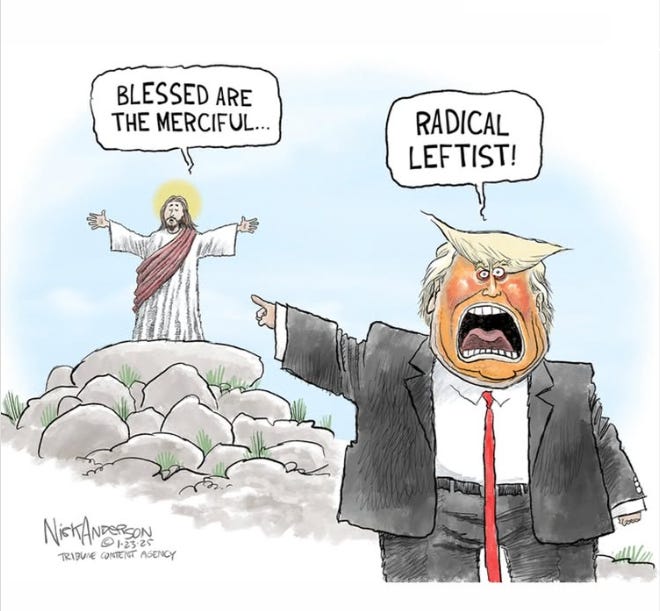
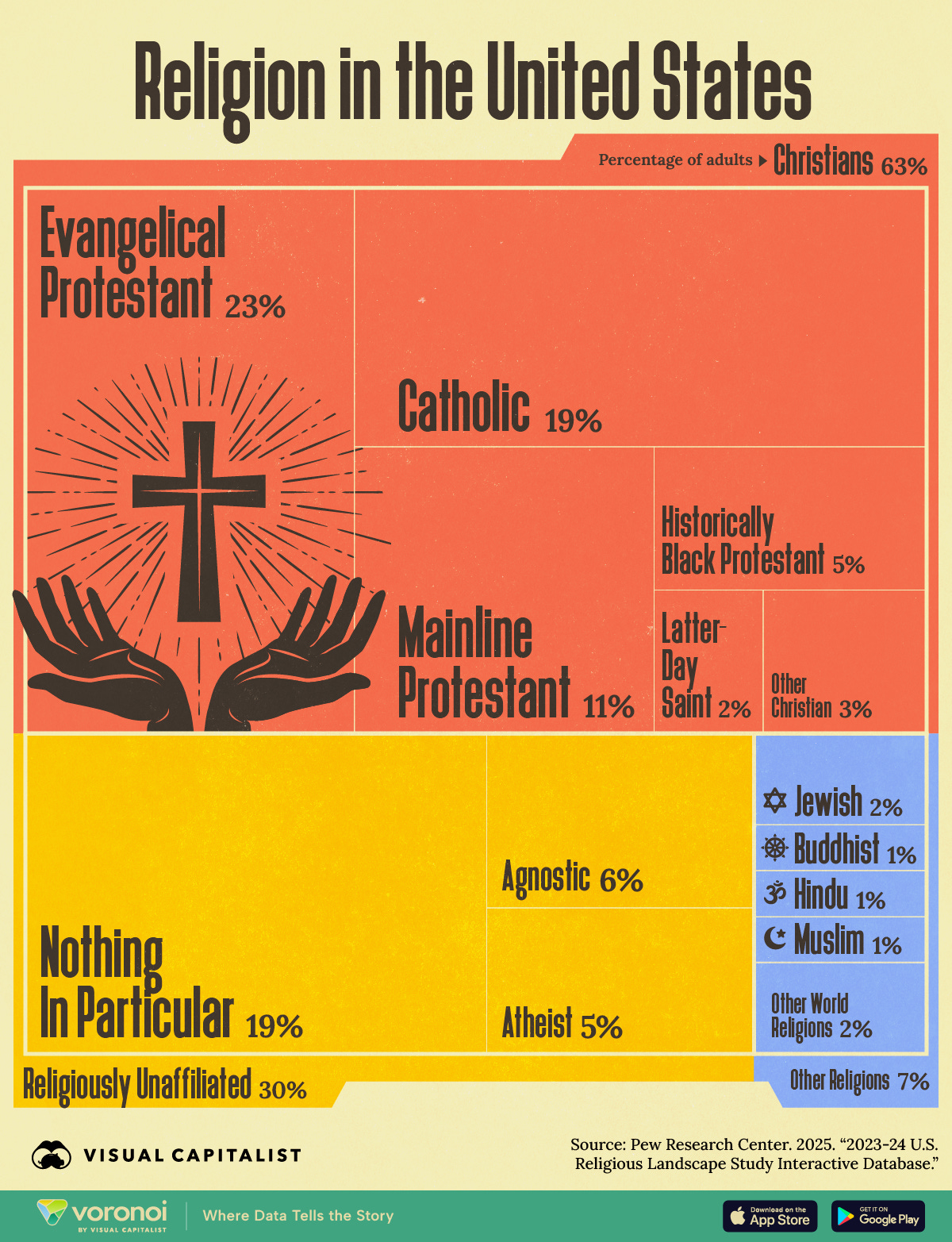
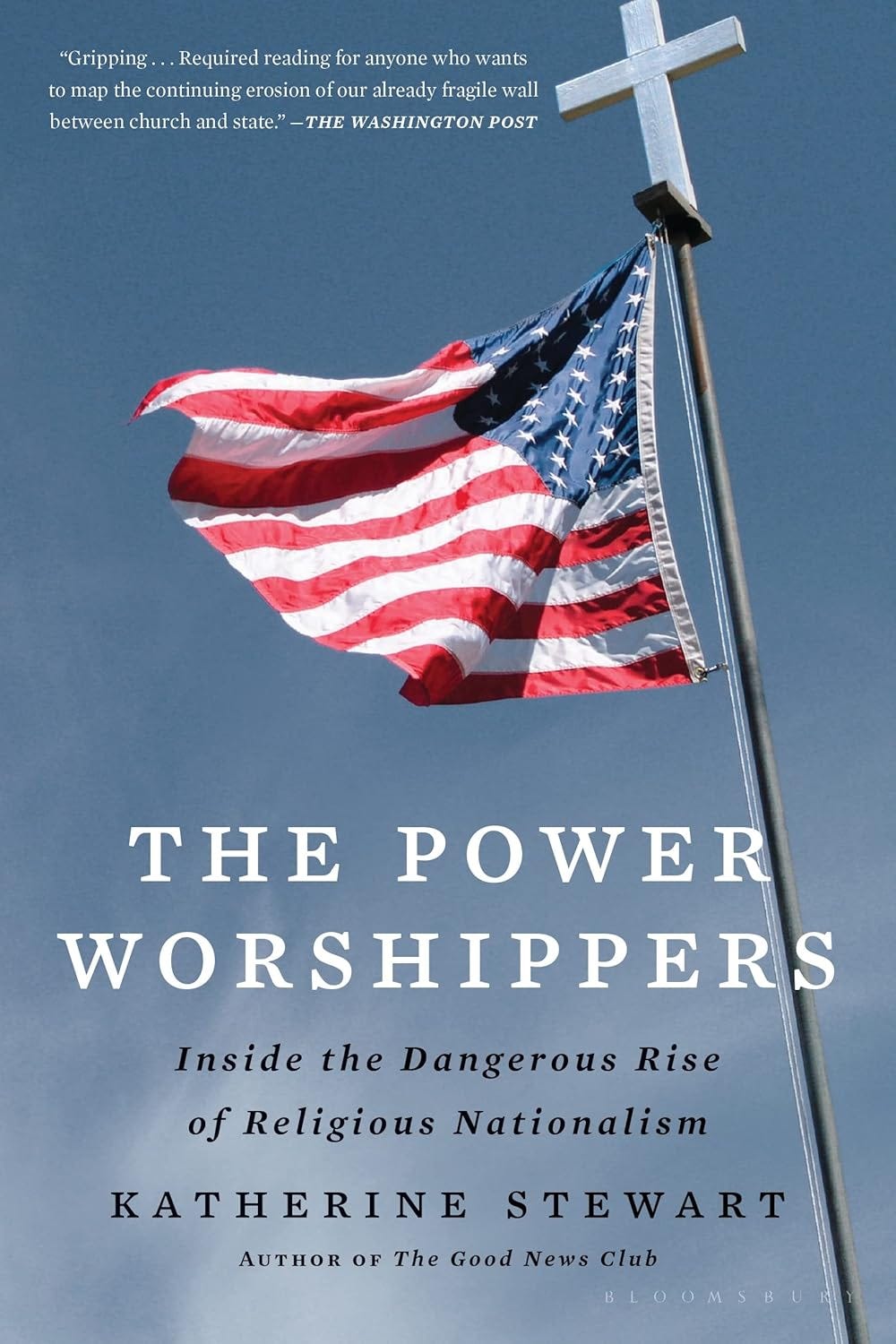

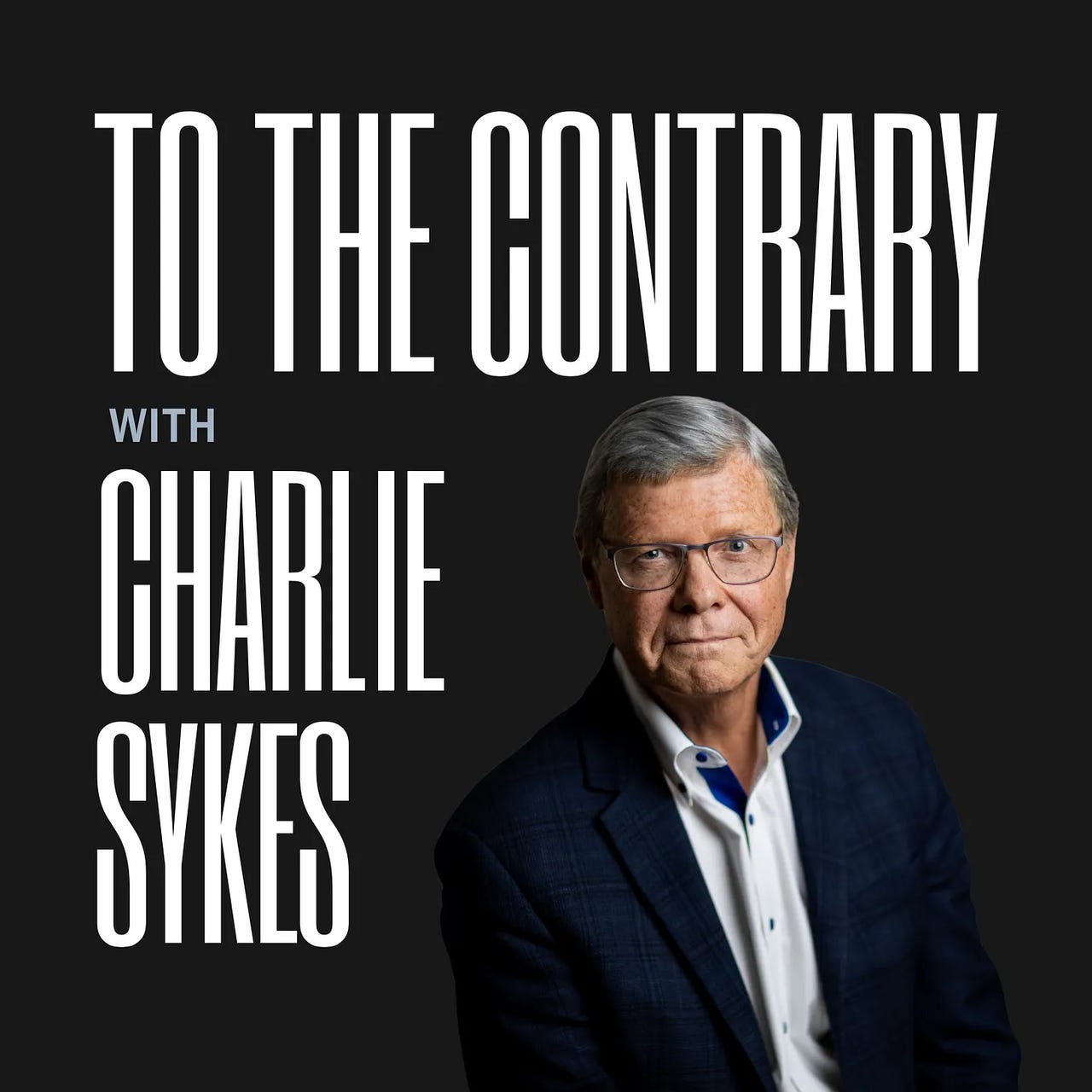
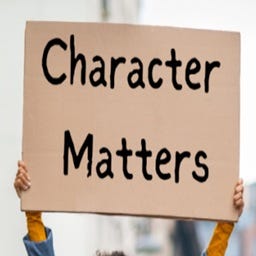
Totally agree. Grew up in similar type of church with same two main commandments. MAGA Theologists do Not practice either. Can you imagine any of them checking their intentions (before acting) via a litmus test of “Am I loving my neighbor as myself?”
You really covered it, Ann — this phenomenon is why I work with BridgeMaryland a Gamaliel affiliate. It is an alliance of congregations training each other in community organizing to foster justice -/ and we are multi-faith.